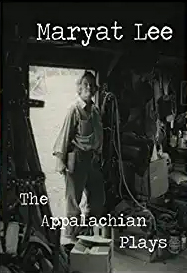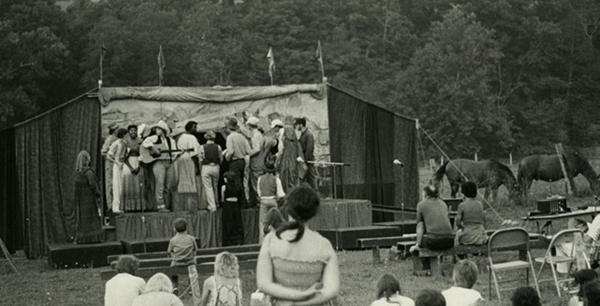By Steve Flairty
NKyTribune columnist
Covington native Mary Attaway (Maryat) Lee was raised in privilege on the banks of the Ohio River. Born in 1923 to a lawyer/businessman father and a mother who was a musician, she later attended a private day school in Washington, D.C., colleges at Northwestern University, Wellesley College, and did graduate study at Columbia University and Union Theological Seminary.
Her life’s work and passion, however, saw her embrace less advantaged people and to encourage, through the vehicle of dramatic production, less pretension and unabashed authenticity. She focused on acknowledging the dignity of all individuals. Put another way, she wanted to help others to celebrate simply “being themselves” and to take pride in their differences—no matter their station in society.
I gained acquaintance with the life of this intriguing Kentuckian recently when writer/editor David T. Miller, of Lexington, gave me a copy of his new book, Maryat Lee: The Appalachian Plays, which both chronicles much of her life and features scripts for four dramatic productions by the EcoTheater, founded by her in 1975 at Powley Creek, near Hinton, West Virginia. This followed Lee becoming a leading figure in avant-garde, outdoor theatre in New York City, doing so starting in Harlem in the early 1950s with a street play called Dope! about drug abuse and which included real users in the cast. It was revived in the mid-1960s as a New York street play. In 1965, she founded the Soul and Latin Theater in East Harlem before starting West Virginia endeavor.
In the book, David, a West Virginian native, relates a fascinating story of how he met and worked with Lee at her EchoTheater performances at Powley Creek in the summer of 1981. It was a time when after graduating from college a few years earlier and taking dead-end jobs, he “returned home broke, disillusioned and aimless at the dawn of the Reagan era” and “needed a job.” He answered an ad for a musician and someone to keep “teens in line” for an outdoor play called John Henry, the “steel-drivin’ man who happened to be a local legend Powley’s Creek. David took the job, played his guitar and served as the music director, did some acting, drove the flatbed company truck (the challenge was maneuvering it through a narrow tunnel near the location) and helped supervise the diverse and non-polished band of teens involved in Lee’s production.
In Lee, David met a person he’ll never forget. “It soon became clear to me that Maryat Lee was an odd duck for southern West Virginia, apparently (though not provocatively) a lesbian, an intellectual,” he said. “I learned from local friends that, as is typical for rural, southern West Virginia, she was viewed with suspicion and disdain when she first moved to the area. But she and I hit it off immediately, as soon as I stopped trying to impress her with pretended knowledge of things I could not possibly know.”
Lee, despite having an “odd duck” characterization, found connection to several well-known individuals and media sources. Baseball’s Jackie Robinson, Black pioneer major league baseball player, actively supported her afore-mentioned signature production, Dope! She also appeared to be a close friend to the noted author Flannery O’Connor, as the two corresponded with personal letters over a lengthy period. Lee studied under well-known theologian Paul Tillich and worked under cultural anthropologist Margaret Mead. Actors Ossie Davis and Estelle Parsons made their way to the state to observe, adding their experienced feedback to Lee’s work, which they admired. Additionally, she was covered in Life magazine, Variety, The New York Times, The New Yorker, and television.
Dr. William French, an associate professor of modern drama and Shakespeare, writes a stirring introduction to the scripts for the following Appalachian plays by Lee, which include interesting author notes by her for the first three. The four plays are: Four Men and a Monster (based on memories of Lee’s childhood in Kenton County), John Henry, Ole Miz Dacey, and A Double-Threaded Life. A section on audience responses and discussion provides a look at how powerful the indigenous performances could be.
And for a more precise examination of what Lee’s EcoTheater entailed, David presents an appendix with a definition of the EcoTheater concept, standards and patterns, notes for the mission statement, unifying principles of a new theater, and starting a seed company of similar ones.
For truth, Maryat Lee was a different sort. She both was highly intelligent and astutely intuitive of human nature—and willing to think differently. She strived for authenticity. Here are some ML quotes I gleaned from Miller’s book that will, I believe, demonstrate that observance:
“If people present something that reflects the integrity of their own persons and place, –no matter if things be spelled or pronounced ‘wrong’—as long as it can be heard, it has its own integrity and style. One need think only of primitive sculpture or painting to understand that they have qualities that can be judged only on their own standards, not on ours.”
“The most important feature of rehearsals was to build the confidence of the actors. Not all of the kids wanted to act in the first place. That was for me an asset. It meant I was spared the embarrassment of star-struck people who wanted nothing better than to pretend to anyone else than who they were.”
(Regarding a specific production of her Four Men and a Monster, a play about uprooted mountain men trying to make good in a city)
“Performed by professional actors at the Playhouse in the Park, Cincinnati, and sensitively directed, the performance was a torture to me. Between rehearsals the actors demonstrated that they could speak Cockney and distinguish whether it originated on the east or south side of London; but they had not the slightest glimmer that southern American speech has even more variations, not to mention that it is worlds removed from southern mountain speech at all.”
David deserves praise for his passionate work in putting this fine representation of Maryat Lee and her work together. Dipping into the well-spring of memories of a summer he spent nearly four decades ago, he presents a well-researched and well-written account of a native Kentuckian who followed the lead of her heart and mind, and who had the staying power to achieve a niche many of us might envy, which is to offer one’s true self and assist others to do likewise.
Lee died in 1989 and is buried in Highland Cemetery, in Ft. Mitchell.





























